Kamala Harris
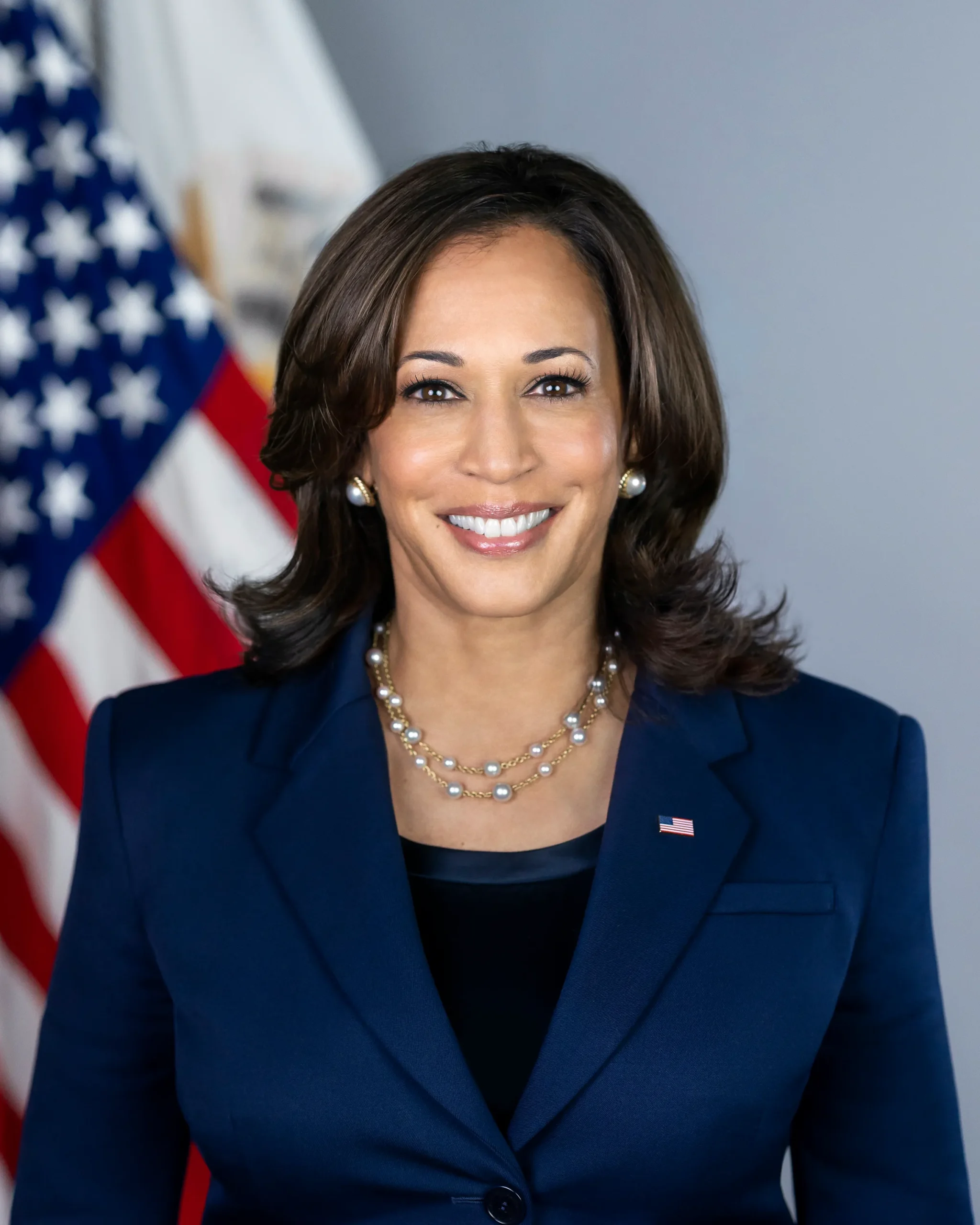
Who is Kamala Harris?
Kamala Devi Harris (born October 20, 1964) is an American politician and attorney who made history as the 49th vice president of the United States, serving from 2021 to 2025 under President Joe Biden. As the first female vice president, she became the highest-ranking woman in U.S. history. She also made history as the first African-American and the first Asian-American to hold the office. Prior to serving as vice president, Harris represented California as a U.S. senator from 2017 to 2021. She was also California’s attorney general from 2011 to 2017 and served as the district attorney of San Francisco from 2004 to 2011. A member of the Democratic Party, Harris ran as the party’s nominee in the 2024 presidential election, becoming the first Asian-American woman to be nominated by a major U.S. political party for president.
Born in Oakland, California, Harris graduated from Howard University and the University of California, Hastings College of the Law. She began her legal career in the Alameda County District Attorney’s Office before being recruited to the San Francisco District Attorney’s Office and later the San Francisco City Attorney’s Office. In 2003, she was elected district attorney of San Francisco, and in 2010, she was elected attorney general of California, making history as the first woman, first African American, and first Asian American to hold the position. She was re-elected as attorney general in 2014.
Harris was elected as California’s junior U.S. senator in 2016, becoming the second Black woman and the first South Asian American to serve in the Senate. During her time as a senator, she advocated for stricter gun control, the DREAM Act, federal cannabis legalization, and healthcare and tax reforms. She gained national attention for her pointed questioning of President Donald Trump’s administration officials, particularly during Senate hearings such as those for Brett Kavanaugh, Trump’s second Supreme Court nominee.
In 2019, Harris ran for the 2020 Democratic presidential nomination but withdrew before the primaries. She was then selected by Joe Biden as his running mate, and together, they defeated the incumbent Republican president, Donald Trump, and vice president Mike Pence in the 2020 election. Upon entering office, Harris presided over an evenly split U.S. Senate, casting more tie-breaking votes than any other vice president. Her crucial votes helped pass significant legislation like the American Rescue Plan and the Inflation Reduction Act.
After Biden withdrew from the 2024 presidential race, Harris launched her own presidential campaign with Biden’s endorsement. She became the Democratic nominee at the 2024 Democratic National Convention, with Minnesota Governor Tim Walz as her running mate. However, in the November 2024 election, Harris was defeated by Donald Trump.
Quick Details
| Full Name | Kamala Devi Harris |
| Date of Birth | October 20, 1964 |
| Birthplace | Oakland, California, U.S. |
| Current Residence | Number One Observatory Circle |
| Nationality | American |
| Gender | Female |
| Birthday | October 20 |
| Age | 60 |
| Height | 5′ 5″ (1.65 m) |
| Weight | 64 kilograms |
| Hair Color | Dark Brown |
| Eyes Color | Brown |
| Education | UC Law San Francisco (1986–1989) Howard University (1986) Westmount High School (1981) |
| Parents | Donald J. Harris Shyamala Gopalan |
| Spouse | Doug Emhoff (married. 2014) |
| Relatives | Family of Kamala Harris |
| Political party | Democratic |
| 49th Vice President of the United States | Assumed office: January 20, 2021 – January 20, 2025 President: Joe Biden Preceded by: Mike Pence Succeeded by: JD Vance |
| United States Senator from California | In office: January 3, 2017 – January 18, 2021 Preceded by: Barbara Boxer Succeeded by: Alex Padilla |
| 32nd Attorney General of California | In office: January 3, 2011 – January 3, 2017 Governor: Jerry Brown Preceded by: Jerry Brown Succeeded by: Xavier Becerra |
| 27th District Attorney of San Francisco | In office: January 8, 2004 – January 3, 2011 Preceded by: Terence Hallinan Succeeded by: George Gascón |
Early Life & Education
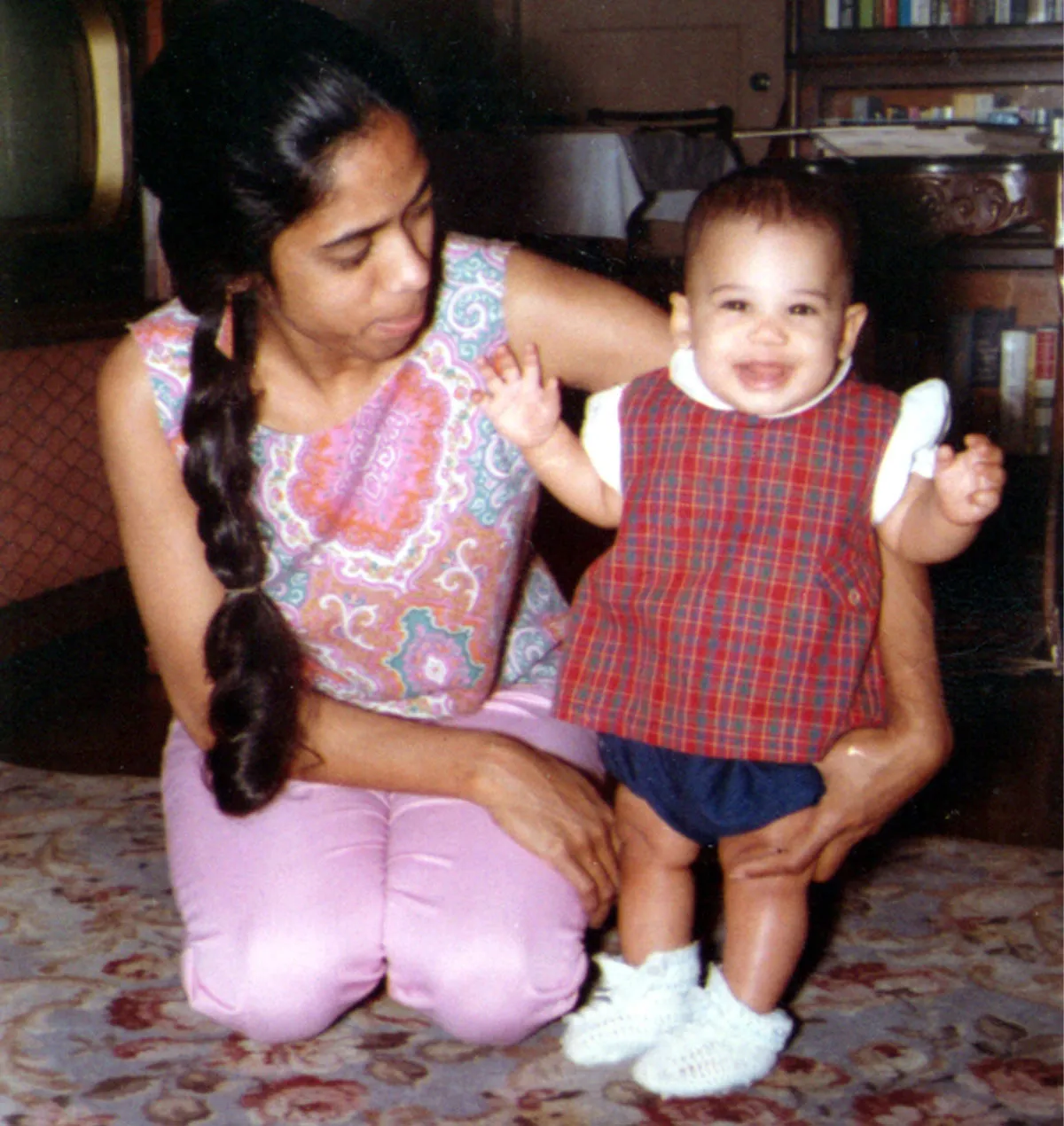
Kamala Devi Harris was born on October 20, 1964, in Oakland, California. Her mother, Shyamala Gopalan, was an Indian biologist who immigrated to the U.S. in 1958 to study endocrinology at UC Berkeley. She later became a pioneering breast cancer researcher. Her father, Donald J. Harris, an Afro-Jamaican economist, immigrated in 1961 and was the first Black scholar to earn tenure in Stanford’s economics department. Kamala’s parents met in 1962, married in 1963, and lived in Berkeley until their separation in 1970, divorcing when she was seven.
Following the divorce, Kamala and her sister, Maya, were raised by their mother in Berkeley, though they spent weekends with their father in Palo Alto. In 1976, Shyamala took a research position in Montreal, Canada, where Kamala attended Westmount High School, graduating in 1981.
Harris briefly attended Vanier College in Montreal before enrolling at Howard University in Washington, D.C. There, she joined Alpha Kappa Alpha sorority and graduated in 1986 with a degree in political science and economics. She later earned her Juris Doctor from UC Hastings College of the Law in 1989, where she was president of the Black Law Students Association.
Career
Early career
In 1990, Kamala Harris began her legal career as a deputy district attorney in Alameda County, California, earning a reputation as a skilled prosecutor. In 1994, while dating California Assembly Speaker Willie Brown, she was appointed to the state Unemployment Insurance Appeals Board and later the California Medical Assistance Commission.
In 1998, San Francisco District Attorney Terence Hallinan recruited Harris as an assistant district attorney, where she led the Career Criminal Division, overseeing five attorneys and prosecuting serious crimes, including homicide, robbery, and sexual assault. In 2000, she transitioned to San Francisco City Hall, working under City Attorney Louise Renne, where she managed the Family and Children’s Services Division, handling child abuse and neglect cases. Renne later endorsed Harris in her campaign for district attorney.
San Francisco district attorney (2002–2011)
In 2002, Kamala Harris ran a strong campaign for San Francisco district attorney, defeating incumbent Terence Hallinan with 56% of the vote, making history as the city’s first person of color elected to the position. She won re-election unopposed in 2007.
Early in her tenure, Harris tackled a backlog of homicide cases, clearing 27 of 74 within six months. She also pushed for higher bail in gun-related crimes to deter offenders. Consistent with her campaign promise, she opposed the death penalty, including in high-profile cases such as the 2004 killing of SFPD officer Isaac Espinoza and the 2009 murder of a father and his two sons by an alleged MS-13 gang member.
Harris established a Hate Crimes Unit to address violence against LGBT youth and introduced the Gwen Araujo Justice for Victims Act. She also launched an environmental crimes unit and supported San Francisco’s sanctuary city policy. In 2004, she created the San Francisco Reentry Division to reduce recidivism among drug offenders, achieving a significantly lower reoffending rate than the state average.
Committed to addressing youth crime, Harris initiated a citywide truancy crackdown in 2006, highlighting the link between school absenteeism and criminal behavior. By 2009, her efforts had reduced chronic truancy in elementary schools by 23%, though only seven parents were prosecuted, none of whom were jailed.
Attorney general of California (2011–2017)
Kamala Harris was elected attorney general of California in 2010, making history as the first woman, African American, and South Asian American to hold the position. She took office on January 3, 2011, and was re-elected in 2014, serving until she resigned in 2017 to join the U.S. Senate.
Her campaign received strong endorsements from leading California Democrats, and she narrowly defeated Republican Steve Cooley in the general election. As attorney general, Harris focused on consumer protection, criminal justice reform, and privacy rights. She secured major settlements against corporations like JPMorgan Chase and Corinthian Colleges, recovering billions for Californians. She also championed the Homeowner Bill of Rights to curb predatory foreclosure practices.
Harris worked with tech giants like Apple, Google, and Facebook to improve data transparency and established the Privacy Enforcement and Protection Unit to address cyber privacy issues. Under her leadership, California won settlements against companies for privacy violations.
In criminal justice reform, she launched initiatives to reduce recidivism and provide job training for nonviolent offenders. However, she faced criticism for her office’s handling of wrongful conviction cases and its stance on prison labor. Despite this, she advocated for progressive policies, including banning the gay panic defense in courts and opposing Proposition 8, California’s same-sex marriage ban.
U.S. senator (2017–2021)
After Senator Barbara Boxer announced she would not seek reelection in 2016, Kamala Harris launched her Senate campaign. She quickly became a frontrunner, winning 78% of the California Democratic Party’s vote at the convention and securing endorsements from prominent figures, including Governor Jerry Brown and President Barack Obama. In the top-two primary system, Harris led with 40% of the vote and later defeated fellow Democrat Loretta Sanchez in the general election with over 60% of the vote. She became the second Black woman and first South Asian American senator in U.S. history.
As a senator, Harris focused on gun control, immigration, healthcare, and tax reforms. She gained national recognition for her sharp questioning of Trump administration officials, including Jeff Sessions, Brett Kavanaugh, and William Barr. She was a vocal critic of Trump’s policies, including the travel ban on several Muslim-majority countries and the family separation policy at the border. She also co-sponsored major legislation, such as the Green New Deal and the DREAM Act.
Harris played a role in Trump’s impeachment proceedings, advocating for accountability and voting to convict him. She worked on bipartisan bills, including bail reform and election security, and led efforts to combat hate crimes, including the Justice for Victims of Lynching Act.
After being elected Vice President of the United States in 2020, Harris resigned from the Senate on January 18, 2021, and was succeeded by Alex Padilla.
Committee assignments
While in the Senate, Harris was a member of the following committees:
- Committee on the Budget
- Committee on Homeland Security and Governmental Affairs
- Subcommittee on Federal Spending Oversight and Emergency Management
- Subcommittee on Regulatory Affairs and Federal Management
- Select Committee on Intelligence
- Committee on the Judiciary
- Subcommittee on the Constitution
- Subcommittee on Oversight, Agency Action, Federal Rights and Federal Courts
- Subcommittee on Privacy, Technology and the Law
Caucus memberships
- Congressional Asian Pacific American Caucus
- Congressional Black Caucus
- Congressional Caucus for Women’s Issues
2020 presidential election
Presidential campaign
Kamala Harris was widely seen as a top contender for the 2020 Democratic presidential nomination. She hinted at a potential run in 2018 and published a memoir, signaling her intentions. On January 21, 2019, she officially launched her campaign, raising a record-breaking amount in the first 24 hours. Her campaign kickoff in Oakland drew over 20,000 attendees.
During the June 2019 Democratic debate, Harris gained national attention for confronting Joe Biden over his past opposition to mandatory school busing, leading to a surge in her polling numbers. However, in the following debate, Biden and Tulsi Gabbard criticized her prosecutorial record, contributing to a decline in support. She faced scrutiny over her stance on criminal justice policies, including defending California’s death penalty.
Despite early momentum, Harris struggled with declining poll numbers and funding issues. On December 3, 2019, she suspended her campaign. In March 2020, she endorsed Joe Biden for president. Throughout her campaign, she was strongly supported by an online group known as the #KHive, which defended her against racist and sexist attacks.
Vice presidential campaign
In May 2019, senior members of the Congressional Black Caucus endorsed the idea of a Biden–Harris ticket. After Biden’s landslide victory in the South Carolina primary and Super Tuesday wins, House Whip Jim Clyburn urged him to choose a Black woman as his running mate. In March 2020, Biden committed to selecting a woman.
Harris expressed interest in the role in April, and after the George Floyd protests in May, calls intensified for Biden to pick a Black woman, with Harris and Val Demings emerging as strong contenders. By June, Harris was seen as the front-runner, with The New York Times citing her extensive political experience.
On August 11, 2020, Biden announced Harris as his running mate, making her the first African American, first Indian American, and third woman on a major-party ticket. She also became the first person from the Western U.S. to appear on the Democratic ticket. Following Biden’s victory in the 2020 presidential election, Harris became the vice president-elect.
Vice presidency (2021–2025)
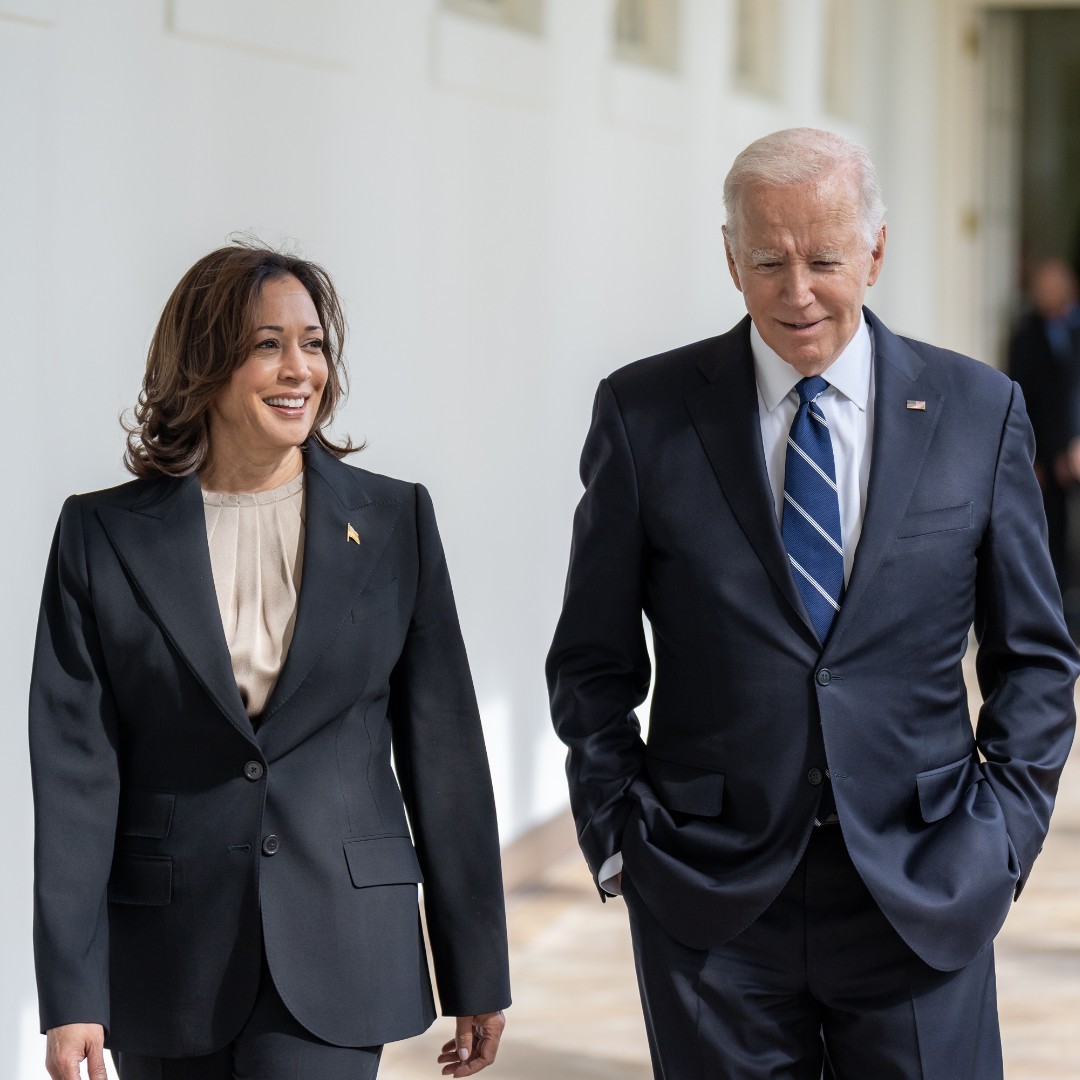
Kamala Harris made history on January 20, 2021, when she was sworn in as Vice President of the United States at 11:40 a.m. by Justice Sonia Sotomayor. Her inauguration marked several milestones: she became the first woman, the first African-American, and the first Asian-American to hold the office of Vice President. Additionally, she is the third individual with acknowledged non-European ancestry to serve as either president or vice president.
One of her first acts as Vice President was to swear in three new senators: Alex Padilla, her successor in the Senate, and Georgia senators Raphael Warnock and Jon Ossoff. Harris assumed office during a politically charged time, with the 117th Congress’s Senate evenly split 50–50 between Republicans and Democrats. This division frequently required her to cast tie-breaking votes as president of the Senate. On February 5, 2021, she cast her first two tie-breaking votes, which were crucial in passing the American Rescue Plan Act of 2021, a stimulus package proposed by President Biden that received no Republican support.
Harris quickly set records with her tie-breaking votes. By July 20, 2021, she had surpassed Mike Pence’s record for the most tie-breaking votes in the first year of a vice presidency, casting her seventh in just six months. By the end of her first year, she had cast 13 tie-breaking votes, the most in a single year in U.S. history, exceeding John Adams’ record of 12 in 1790. On December 5, 2023, she broke another record, casting her 32nd tie-breaking vote, surpassing John C. Calhoun’s 31 votes over nearly eight years.
On November 19, 2021, Harris briefly served as acting president while President Biden underwent a colonoscopy, becoming the first woman and the third person overall to assume the powers of the presidency temporarily.
Harris has played a pivotal role in the Biden administration, particularly due to her tie-breaking vote in the Senate and her position as a potential front-runner for the 2024 presidential election if Biden chose not to seek re-election.
In March 2021, Biden tasked Harris with addressing the root causes of migration from Central America to the U.S. by working with Mexico and Northern Triangle nations (El Salvador, Guatemala, and Honduras). This effort led to the creation of the Root Causes Strategy (RCS), which included initiatives such as task forces on corruption and human trafficking, the Partnership for Central America, and investment funds for housing and businesses. Despite being labeled a “border czar” by some media outlets, Harris rejected the title and clarified that she had no authority over the border itself.
Harris conducted her first international trip as Vice President in June 2021, visiting Guatemala and Mexico to address migration issues. During her visit, she urged potential migrants not to make the dangerous journey to the U.S.-Mexico border. Her work in the region resulted in several initiatives, including programs for women’s empowerment and investments in housing and businesses.
Harris also played a key diplomatic role in strengthening U.S. alliances. In November 2021, she met with French President Emmanuel Macron to repair ties after the cancellation of a submarine program. During Macron’s visit to the U.S. in November 2022, the two leaders agreed to enhance U.S.-France space cooperation.
In April 2021, Harris revealed that she was the last person in the room before Biden decided to withdraw U.S. troops from Afghanistan, praising his courage and decision-making. National Security Advisor Jake Sullivan highlighted her active role in key decision-making meetings, where she often provided unique perspectives.
Following Russia’s invasion of Ukraine in February 2022, Harris was dispatched to Germany and Poland to rally support for Ukraine and advocate for sanctions against Russia. In April 2023, she visited the Goddard Space Flight Center with South Korean President Yoon Suk Yeol, pledging to strengthen the U.S.-South Korea space alliance.
In November 2023, Harris pledged unconditional U.S. aid to Israel during its conflict with Hamas in Gaza. However, by March 2024, she criticized Israel’s actions, calling for an immediate six-week ceasefire to facilitate the release of hostages and the delivery of humanitarian aid.
2024 presidential election
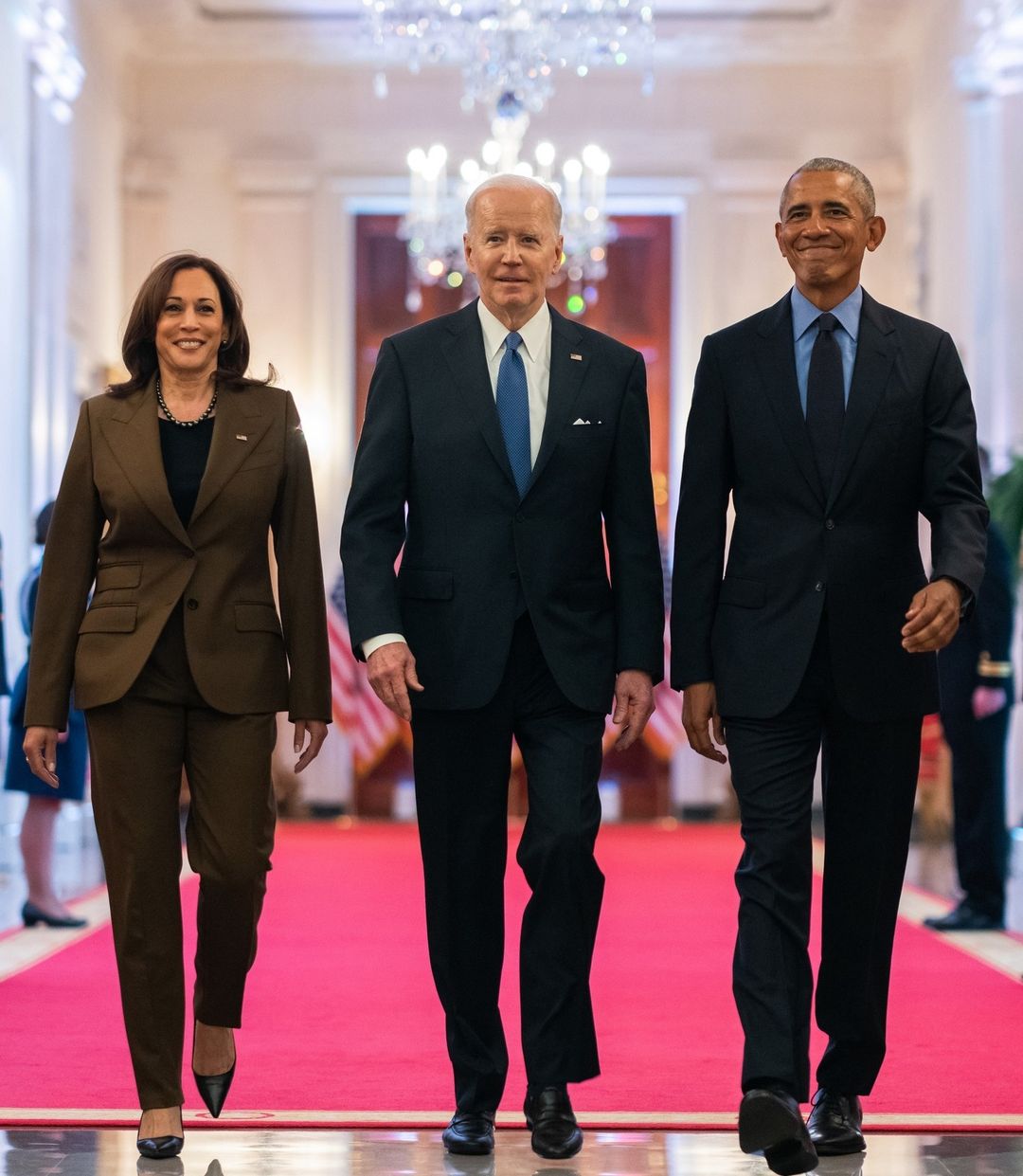
In April 2023, President Joe Biden announced his reelection campaign with Vice President Kamala Harris as his running mate. However, after the Democratic primaries, Biden suspended his campaign on July 21, 2024, and endorsed Harris for president. She secured the nomination through a virtual delegate roll call on August 5, 2024, and announced Minnesota Governor Tim Walz as her vice-presidential pick. Harris officially accepted the nomination on August 22, 2024, at the Democratic National Convention.
During the campaign, she faced criticism from former President Donald Trump, who labeled her as a “radical liberal,” particularly on abortion rights. Despite winning the September 10, 2024, presidential debate against Trump, her campaign struggled to distinguish her from the Biden administration, with polls remaining close. In October, Harris delivered a “closing argument” speech, but her comments on gender-affirming surgery for prisoners were heavily criticized by Trump, who launched a costly ad campaign targeting her.
Harris ultimately lost the 2024 presidential election to Trump, conceding on November 7, 2024, after losing key battleground states and the Electoral College. Harris lost the popular vote 48.3% to 49.8%, and her defeat was attributed to factors such as economic challenges, particularly the inflation surge from 2021-2023, and the rightward trend of states compared to the 2020 election. On January 6, 2025, Harris presided over the certification of Trump and his running mate Vance as the winners of the election.
Post-vice presidency (2025–present)
Kamala Harris left office on January 20, 2025, when JD Vance succeeded her as the 50th vice president of the United States. After leaving office, she and her husband moved to Los Angeles, where they assisted in distributing food to victims of the Palisades Fire.
Reports from The New York Times and Politico suggested that Harris, with the largest donor network in the Democratic Party, may consider running for president again in 2028, though her 2024 loss could present a challenge. USA Today reported that Harris had intended to run in 2028 before President Biden’s withdrawal from the race.
New York Magazine noted that in 2025, Harris was weighing her options, which included running for president, seeking the governorship of California in 2026, or potentially retiring from politics.
Personal Life
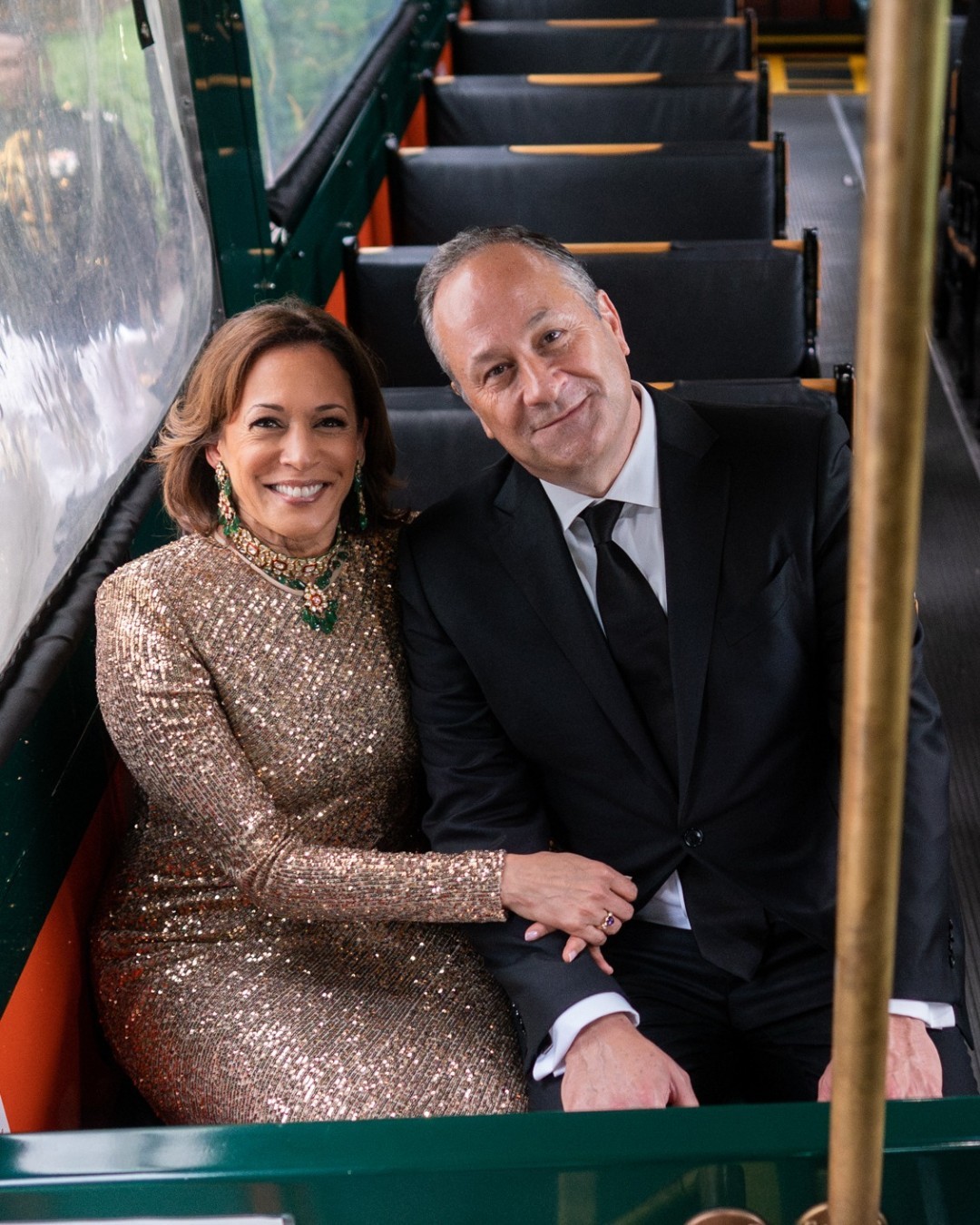
In the early 1970s, Kamala Harris frequently visited Chennai, India, with her mother, where they stayed with her maternal grandfather. During these visits, she learned to wear traditional Indian dress and picked up a few phrases of Tamil.
In the 1990s, Harris dated Willie Brown, the Speaker of the California Assembly and later Mayor of San Francisco, followed by a brief relationship with talk show host Montel Williams in 2001.
Harris met her husband, attorney Doug Emhoff, in 2013 through a mutual friend who set them up on a blind date. Emhoff, from a Jewish family, is an entertainment lawyer who became partner-in-charge at Venable LLP’s Los Angeles office. They married on August 22, 2014, in Santa Barbara, California. Harris is stepmother to Emhoff’s two children, Cole and Ella, from his previous marriage to film producer Kerstin Emhoff. As of August 2024, their estimated net worth was $8 million.
Harris is a Baptist and holds membership in the Third Baptist Church of San Francisco, which is part of the American Baptist Churches USA. She is also a member of The Links, an exclusive social and service organization for prominent Black American women. Additionally, Harris is a gun owner.
Public image
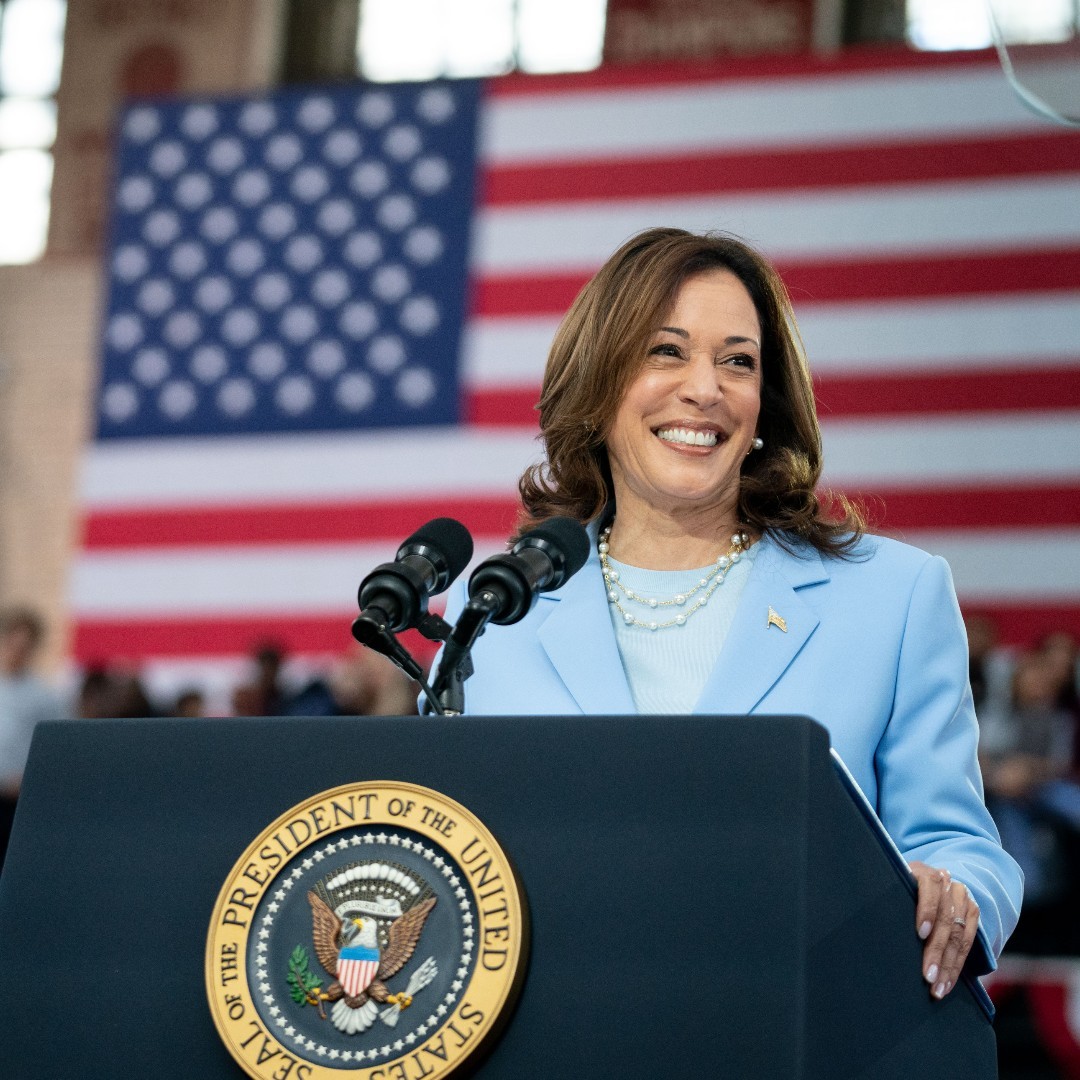
In the early 1970s, Kamala Harris frequently visited Chennai, India, with her mother, where they stayed with her maternal grandfather. During these visits, she learned to wear traditional Indian dress and picked up a few phrases of Tamil.
In the 1990s, Harris dated Willie Brown, the Speaker of the California Assembly and later Mayor of San Francisco, followed by a brief relationship with talk show host Montel Williams in 2001.
Harris met her husband, attorney Doug Emhoff, in 2013 through a mutual friend who set them up on a blind date. Emhoff, from a Jewish family, is an entertainment lawyer who became partner-in-charge at Venable LLP’s Los Angeles office. They married on August 22, 2014, in Santa Barbara, California. Harris is stepmother to Emhoff’s two children, Cole and Ella, from his previous marriage to film producer Kerstin Emhoff. As of August 2024, their estimated net worth was $8 million.
Harris is a Baptist and holds membership in the Third Baptist Church of San Francisco, which is part of the American Baptist Churches USA. She is also a member of The Links, an exclusive social and service organization for prominent Black American women. Additionally, Harris is a gun owner.
Publications
Harris has written two nonfiction books and one children’s book.
- Harris, Kamala; O’C. Hamilton, Joan (2009). Smart on Crime: A Career Prosecutor’s Plan to Make Us Safer. San Francisco: Chronicle Books. ISBN 978-0-8118-6528-9.
- Harris, Kamala (January 8, 2019). The Truths We Hold: An American Journey. London: Penguin. ISBN 978-1-9848-8622-4.
- Harris, Kamala (January 8, 2019). Superheroes Are Everywhere. London: Penguin Young Readers Group. ISBN 978-1-9848-3749-3.
